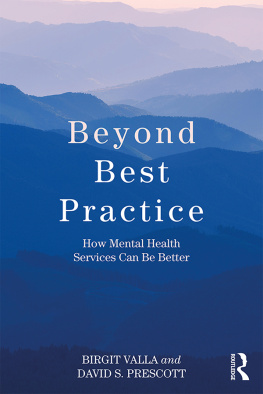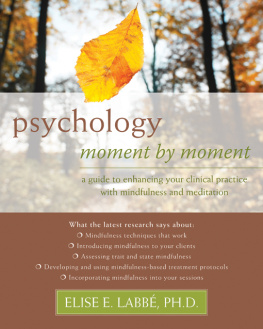Beyond Best Practice
Written by practitioners for practitioners, this empirically grounded book offers clinicians of all backgrounds a guide to incorporating feedback and self-development strategies that will dramatically enhance their therapeutic abilities. Building on the foundation of Feedback-Informed Treatment (FIT), Beyond Best Practice explores the benefits of practising therapy using in-the-moment client feedback, with an emphasis on ongoing, typically solitary, deliberate practice.
Chapters describe the real-world journey of an established master therapist and her agency, examining each element of FIT in detail through her eyes. Her journey is illustrated through discussions with prominent researchers, authors, and former clients, as well as informative experiences outside psychotherapy. Rich case examples of success, failure, and failing successfully are also woven throughout, with a focus on the practical applications and skills needed to become an excellent and effective therapist and agency.
What becomes clear through the many narratives is that we can improve our services by studying the obvious and subtle forms of feedback that are available to us at all times. Beyond Best Practice emphasizes what each practitioner can do to become more effective, one client at a time. It will be essential reading for all mental health practitioners and agencies working at the front lines of medical care.
Birgit Valla is a Norwegian clinical psychologist and leader of a mental health service for children, families, adults, and people with addictions and substance abuse, which is developed based upon the feedback from the people seeking help. Valla is also a writer, lecturer, and public speaker.
David S. Prescott has worked in the field of treating sexual abuse for 34 years and has produced 18 book projects in the areas of abuse and psychotherapy. He lectures around the world and is the recipient of two lifetime achievement awards from international organizations. He is a senior associate for the International Center for Clinical Excellence.
15 years from now, we will realise that we have got it wrong about a lot of things in mental health care. Birgit Valla and David Prescott point us in the direction that we need to go. They have got it right. Buy 10 copies of this book and give them to your colleagues. This book is a conversation-piece we need to have.
Daryl Chow, PhD, author of The First Kiss: Undoing the Intake Model and Igniting First Sessions in Psychotherapy
This book represents ground-breaking ideas about how to think differently about mental health care all over the world. With these ideas Birgit Valla has managed to change the entire system in her home town in Norway. This book is a must-read for anybody interested in delivering better services to the people seeking help from mental health care professionals.
Susanne Bargmann, psychologist, author, trainer and international speaker, Denmark
First published in English in 2019 by Routledge
2 Park Square, Milton Park, Abingdon, Oxon OX14 4RN
and by Routledge
52 Vanderbilt Avenue, New York, NY 10017
Routledge is an imprint of the Taylor & Francis Group, an informa business
2019 Birgit Valla and David S. Prescott
Published in Norwegian by Gyldendal Norsk Forlag 2014
The right of Birgit Valla and David S. Prescott to be identified as authors of this work has been asserted by them in accordance with sections 77 and 78 of the Copyright, Designs and Patents Act 1988.
All rights reserved. No part of this book may be reprinted or reproduced or utilised in any form or by any electronic, mechanical, or other means, now known or hereafter invented, including photocopying and recording, or in any information storage or retrieval system, without permission in writing from the publishers.
Trademark notice: Product or corporate names may be trademarks or registered trademarks, and are used only for identification and explanation without intent to infringe.
British Library Cataloguing-in-Publication Data
A catalogue record for this book is available from the British Library
Library of Congress Cataloging-in-Publication Data
A catalog record has been requested for this book
ISBN: 978-0-367-17510-8 (hbk)
ISBN: 978-0-367-17513-9 (pbk)
ISBN: 978-0-429-05728-1 (ebk)
From Birgit: For my mother, Lise Valla, who taught me about courage.
From David: For my family, who have taught me about optimism.
In 1994, Donald Miller, Jr., of the small Midwest town of Findlay, Ohio, died. His wife, Robin, did her best to move on with her life, using the federal welfare benefits available for taking care of herself and the couples two children. Life had not been easy for the family. In the 1980s, Mr Miller fell on hard times. He lost his job and started drinking, labelling himself an alcoholic. The couple eventually divorced. At the time of his death, he owed more than $32,000 in child support payments.
As sad as the story may be, it is all too familiar to anyone who works in the field of mental health. Life is full of difficulties, challenges, and tragedies. No sooner does one come to our attention than it is replaced by another situation equally sad or worse.
For all that, the Millers would not be so easily forgotten. Their story resurfaced in Judge Allan Daviss Hancock County Probate Court in October 2013. Present at the proceedings, besides the judge, was Mrs Miller and her very-much-alive ex-husband, Donald. As it turns out, the announcement of his death had been premature. At the time of his disappearance, acting under the extreme pressures of mood and circumstance, Mr Miller had simply jumped ship and left town. He took up residence in Florida and Georgia.
Years later, when he returned to his home town, his parents informed him he been declared dead. After failing to send word to his family about what he was doing and his whereabouts, the courts had made this determination at the request of Mrs Miller.
Seated in the courtroom, Donald soon found it was far easier to be dead than to return to the living.
Weve got the obvious here, said the judge. A man sitting in the courtroom. He appears to be in good health.
The problem, Judge Davis asserted, was that Miller had been dead for nine years, thus exceeding the time limit for changing the courts prior ruling.
Its a strange, strange situation, the Honorable Allan Davis concluded, but as far as the law is concerned, youre still deceased.
Strange indeed. No, actually absurd. Donald Miller is clearly alive. That fact is indisputable. No one involved in the saga disagrees. And yet, for all intents and purposes, dead he remains. Rules replaced reality. Process trumped proof.
As remote as this story may seem, in reality, professional mental health finds itself in an equally absurd place. The need for help is obvious. As Mr Miller went to court to solve a problem, every day clients present for treatment to rectify a wrong, improve their lives, get a new start, feel better, and move on. To service the demand, any reasonable person would conclude that it is best to address directly, with each and every client, what they want to be different as a result of meeting with us. Instead, what happens? Year after year, massive amounts of time and money are spent defining the scope of clinical practice and standardizing service delivery. Despite our best intentions, just as in Judge Daviss court, rules ultimately replace our clients reality. Defining their problems, and regulating the methods used to treat them, trump what clients want and how best to achieve it.










